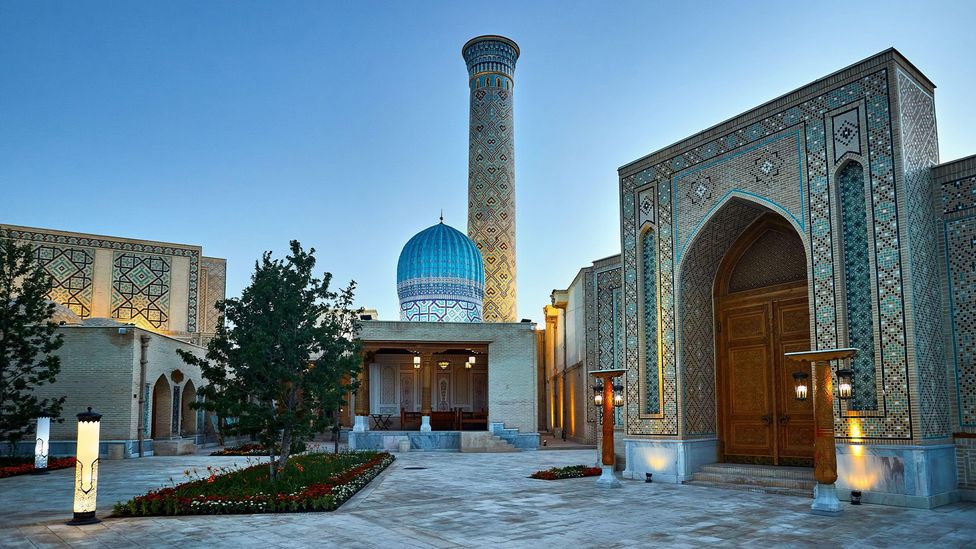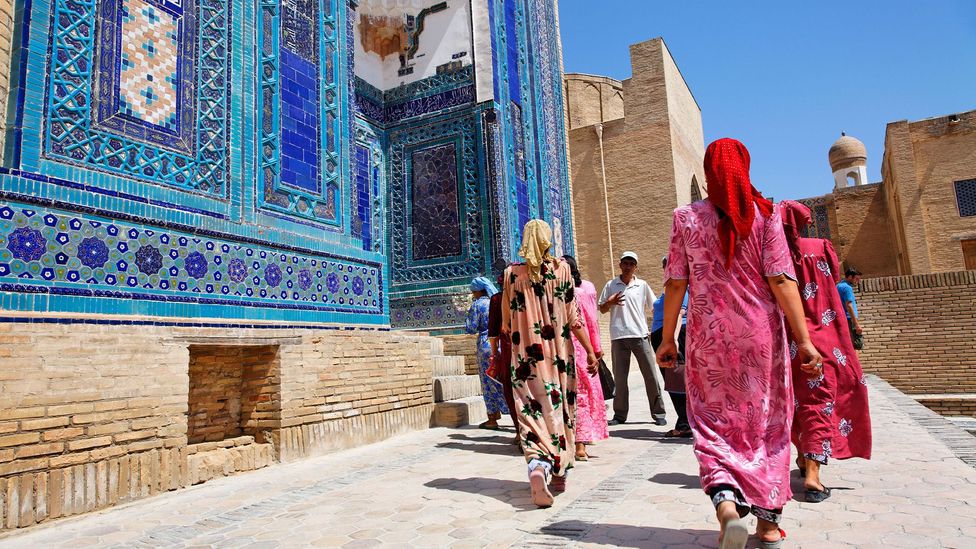Central Asia's glittering new Silk Road jewel
BBC has published an article describing Samarkand as a major Silk Road trading hub for more than 2,500 years. Caliber.Az reprints the article.
Now, the Uzbek city has a major new tourism complex, which it hopes will reflect its former glories.
With a muffled swoosh, the wind-blasted rain rattles across the ancient cobbles, making them shine like the oil-dowsed chickpeas in Uzbekistan's national rice dish, plov. In the flickering light of a single, far-off streetlamp, the vivid turquoise, royal-blue and honey-yellow Timurid tilework glimmers above a portal, or pishtak, covered in Kufic script.
"Shah-i-Zinda is Samarkand's holiest site," my guide, Katia, whispers as we wander through the high-walled alleys of this giant necropolis dedicated to Qasim Ibn Abbas, cousin of the Prophet Muhammad, who was responsible for bringing Islam to this part of the world in the 7th Century.
Jewel of the Silk Road, crucible of cultures and religions, Samarkand's bustling bazaars and mighty monuments have provided inspiration for countless poets. These include James Elroy Flecker, who wrote of rose candy mastic and oil and spice in his epic poem, The Golden Road to Samarkand.
Twenty minutes from Samarkand's gleaming new airport, along a tarmacked thoroughfare that cruelly mocks the country's network of broken potholed roads, the brand-new Silk Road Samarkand resort is as grandiose as anything Amir Timur (who was born in modern-day Uzbekistan and founded Central Asia's sprawling Timurid Empire) could have dreamt of. Eight skyscraper-style luxury hotels and wellness centres cluster around a wide canal that was used to train rowing champions during Soviet times.
Linked by cycle paths and planted with thousands of tiny saplings, the site is still raw and new. Through gaps in the trees, it's possible to see the tatty prefab buildings where 15,000 workers lived during the two and a half years it took to build. The largest complex of its kind in Central Asia, it cost around US $580m to build with investment from local oil and property oligarch Bakhtiyor Fazilov and a Chinese hotel group.

"There's no space in Samarkand's historic centre to develop a project of this scale, so we built it here," general manager Roland Obermeier tells me.
With the stated aim of "fostering local culture", the heart of this modern complex is the so-called Eternal City: a beautifully realised – if somewhat sanitised – version of ancient Samarkand, complete with domes and mosques, restaurants serving somsa (savoury pastries) and shashlik (meat kebabs), and bazaar-style shops, where the country's top artisans demonstrate their age-old crafts.
"Like Amir Timur, who made Samarkand a hub for culture, the Eternal City aims to safeguard Uzbekistan's arts and ancient traditions," explained sixth-generation ceramics master Abdulla Narzullaev, whose work can be found in the British Museum.
When he was re-elected in 2021, current president Shavkat Mirziyoyev spoke of creating a new Uzbekistan with reform of the judiciary, liberalisation of the economy and a new policy of transparency and tolerance. Certain issues have been addressed. Slave labour, which once forced millions of Uzbeks (including children) into the fields to pick cotton, was finally banned in March 2022. But there are still concerns about human rights in other areas, and local shop owners fear that this is likely to deter tourists from visiting.

With one of the fastest-growing populations in the world, and one of the youngest, unemployment is also a problem for Uzbekistan. More than 11 per cent of the population live below the poverty line, and with the average monthly wage only around US$300, nearly two million Uzbeks work abroad – most of them in Russia. But some are coming home.
"There are many people like me who are coming back from overseas because it's possible to find work now when it wasn't before," a soft-spoken front office manager from Tashkent who returned to Uzbekistan to take a job at the Silk Road Samarkand told me. The new complex has created more than 2,000 jobs so far.
As the sun sets in a pool of scarlet over the jagged molars of the Hisar mountain range, ceramics master Narzullaev ushers the last visitor from his shop.
"You see we are creating again; we are living again. This is hope for us after so many years of despair," he tells me. He smiles broadly. "And after all, as Confucius once said: it does not matter how slowly you go, as long as you do not stop."








